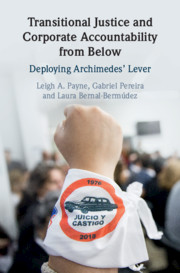Book contents
- Transitional Justice and Corporate Accountability from Below
- Transitional Justice and Corporate Accountability from Below
- Copyright page
- Contents
- Figures
- Tables
- Images
- Acknowledgments
- Introduction Transitional Justice and Corporate Accountability
- 1 Corporate Accountability from Below
- Part I Obstacles to Corporate Accountability
- 2 International Pressure for Corporate Accountability
- 3 The Corporate Veto
- Part II Accountability from Below
- Conclusion The Impact of Accountability from Below
- Appendices
- Bibliography
- Index
3 - The Corporate Veto
from Part I - Obstacles to Corporate Accountability
Published online by Cambridge University Press: 10 April 2020
- Transitional Justice and Corporate Accountability from Below
- Transitional Justice and Corporate Accountability from Below
- Copyright page
- Contents
- Figures
- Tables
- Images
- Acknowledgments
- Introduction Transitional Justice and Corporate Accountability
- 1 Corporate Accountability from Below
- Part I Obstacles to Corporate Accountability
- 2 International Pressure for Corporate Accountability
- 3 The Corporate Veto
- Part II Accountability from Below
- Conclusion The Impact of Accountability from Below
- Appendices
- Bibliography
- Index
Summary
This chapter aims to show with empirical evidence the veto power of business over corporate accountability.It starts discussing the underlying assumption that business veto power stems from its economic power, leading to a history of impunity. Although our judicial action data set seems to confirm patterns of impunity, it also indicates more variation than glib assumptions about economic actors’ power sustain. We explore what type of firm has proved more successful in vetoing judicial accountability, where that veto power over accountability occurs and when economic actors are most likely to successfully use their veto power over accountability. In the second part of the chapter, we explore the strategies economic actors have employed to maintain impunity, specifically legal, non-judicial, unlawful, and mobilizational. The third part of the chapter probes the notion of weakening economic actors’ veto power using our Archimedes’ Lever approach. To lift the weight of corporate accountability, either civil society actors must apply more force or the force of veto powers must be reduced. This section explores that possibility. The concluding section returns to Archimedes’ Lever to summarize the possibilities for change and what steps might contribute to reducing the power of veto players weighing down corporate accountability.
- Type
- Chapter
- Information
- Transitional Justice and Corporate Accountability from BelowDeploying Archimedes' Lever, pp. 113 - 162Publisher: Cambridge University PressPrint publication year: 2020



